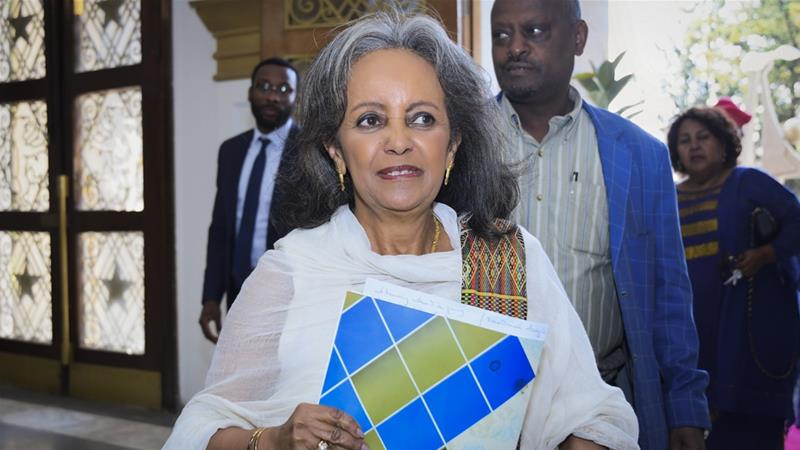Election of first woman to presidency has raised hopes among women’s rights groups for more gender equality in Ethiopia.
The election of Sahle-Work Zewde as Ethiopia‘s first female president has been enthusiastically greeted in Ethiopia and beyond, raising hopes among advocates for gender equality in the conservative country.
The 68-year-old was unanimously approved by the Ethiopian parliament on Thursday to replace Mulatu Teshome, who resigned unexpectedly a day earlier.
While the position of president is largely ceremonial, it carries important symbolic weight and social influence.
Following Zewde’s appointment, congratulatory messages arrived from the African Union (AU), the United Nations and the European Union, as well as other international organisations and leaders around the world.
Experienced diplomat
The softly-spoken, veteran technocrat has worked in diplomacy for more than three decades.
Born in the capital Addis Ababa, Zewde attended university in France. After graduating, she served as Ethiopia’s ambassador to France, Djibouti, Senegal and the Intergovernmental Authority on Development (IGAD), a regional trade bloc in East Africa.
Prior to her appointment as president, she was the UN’s top official at the AU. She is fluent in English and French as well as Amharic, Ethiopia’s official working language.
Abebe Aynete, a senior researcher at the Ethiopian Foreign Relations Strategic Studies think-tank, said Zewde’s experience will make her a competent spokesperson for the country’s political reforms on the international stage.
“As a person who knows the Ethiopian system inside out, Zewde, as president, will offer more continuity in terms of policy but will have her own priorities, including female empowerment,” Aynete told Al Jazeera.
“The fact that Zewde has become the first female Ethiopian president will be a great sign towards achieving gender equality. I consider it as a sort of a glass ceiling being broken down, showing females can also reach positions of high profile,” said Aynete.
‘Positive first step’
Zewde’s appointment to the presidency is not an isolated phenomenon.
The administration of reformist Prime Minister Abiy Ahmed, which assumed office in April, has appointed numerous women to influential positions that have been traditionally reserved for men.
Earlier this month, Abiy filled half of his cabinet with women, including Ethiopia’s first female Defence Minister Aisha Mohammed.
Muferiat Kamil was appointed to lead the newly-created Ministry of Peace, responsible for the police and domestic intelligence agencies.
“If the current change in Ethiopia is headed equally by both men and women, it can sustain its momentum and realise a prosperous Ethiopia free of religious, ethnic and gender discrimination,” Zewde said in a speech in parliament on Thursday.
Aklile Solomon, a female rights activist based in Addis Ababa, welcomed Zewde’s appointment but cautioned that there is more work to be done.
“There is still much to be desired in gender equality, despite the recent moves for gender proportionality in Ethiopian politics,” said Solomon.
Solomon, cofounder of the gender equality-focused Yellow Movement, said the country needs tougher legislation against gender-based violence, as well as policies to encourage female empowerment from the local level to the highest federal office.
“While I consider Zewde’s appointment a positive first step, Ethiopia has a history of female government ministers, which in practice have done little to advance female rights and equality,” she said.
Solomon also said Abiy had yet to speak to women’s rights activists and urged him to open a dialogue with groups focused on gender equality.
Optimism on social media
Ethiopian social media has been flooded with positivity over Zewde’s appointment.
Tsedale Lemma, editor of web magazine Addis Standard, was effusive in her praise.
“In Zewde, what I saw is a woman who consciously decided to humble herself to serve the country she loves; she called it an honour! We can, for once, consider this a decision she and only she had the last say about and accept a role that we often mistake as mere ceremonial,” she said on Twitter.
Zewde’s appointment makes her the only female head of state in Africa currently.
A handful of African countries have in the recent past been led by female presidents with executive powers, including Ellen Johnson Sirleaf in Liberia (2006-18) and Joyce Banda in Malawi (2012-2014).
Zewde herself has noticed the optimism her appointment has created among Ethiopian women.
At her swearing-in ceremony in parliament, she said she planned to raise the issue of female empowerment non-stop over her six-year term.
“I know today I have said a lot about female empowerment, but expect me to be even more vocal in the coming years about female rights and equality,” Zewde said.
SOURCE: Al Jazeera News
